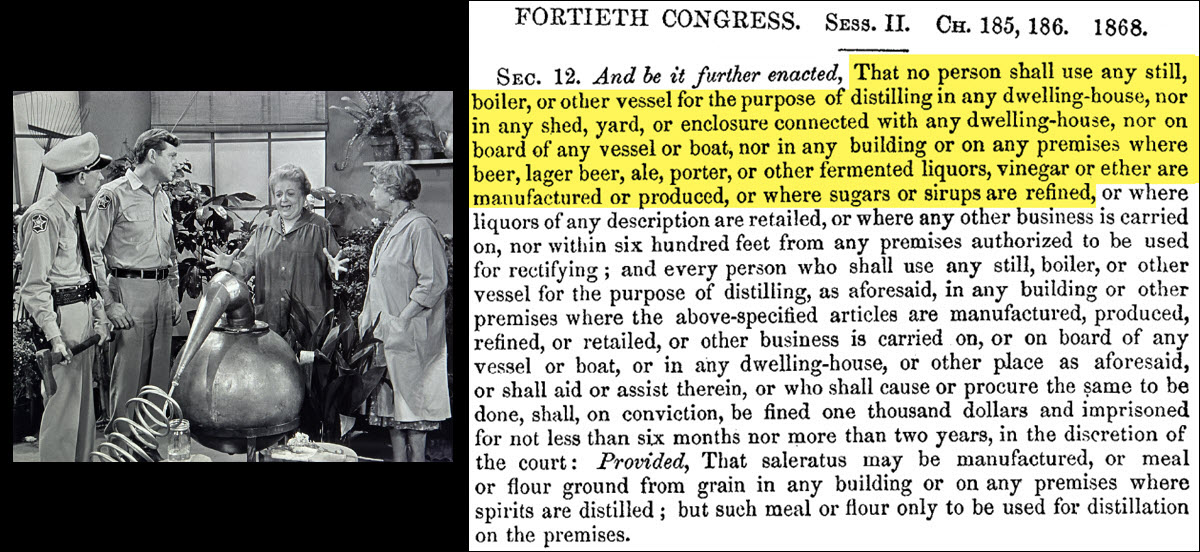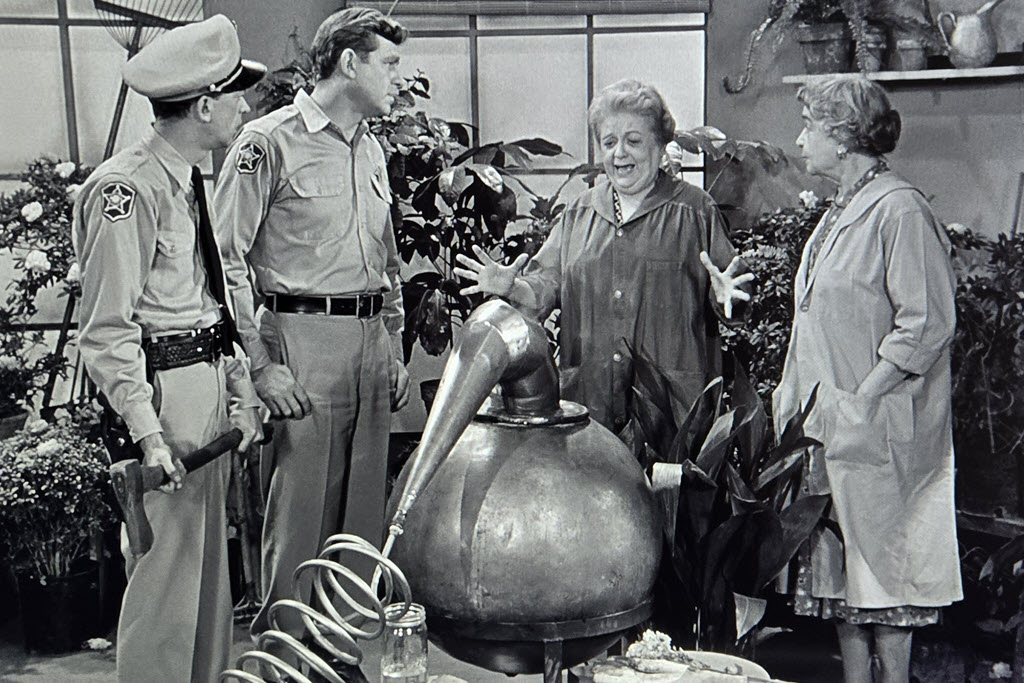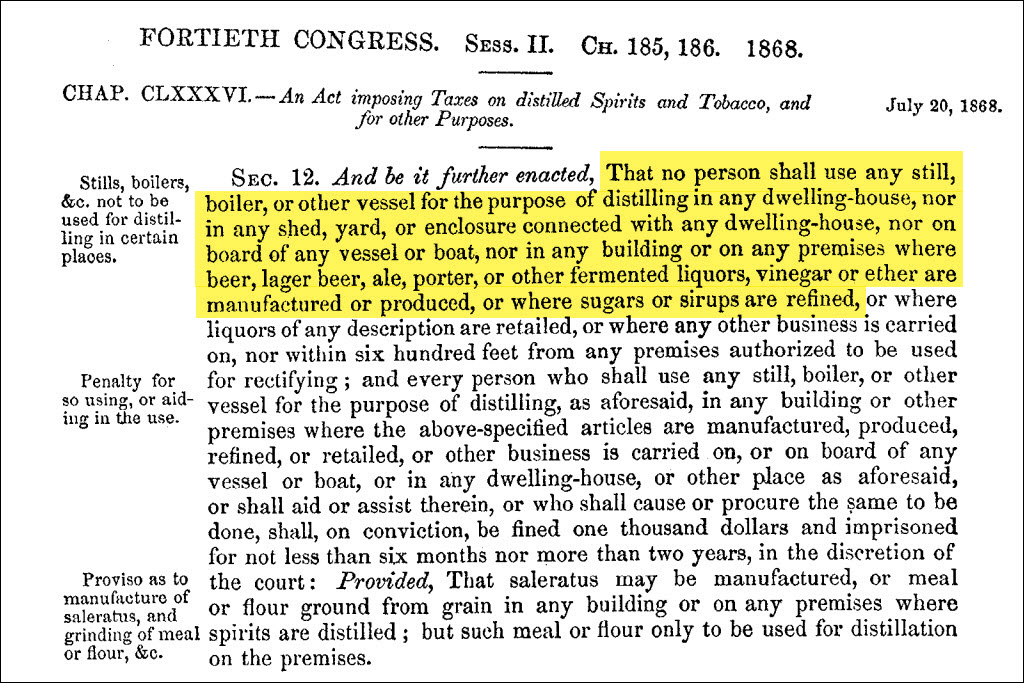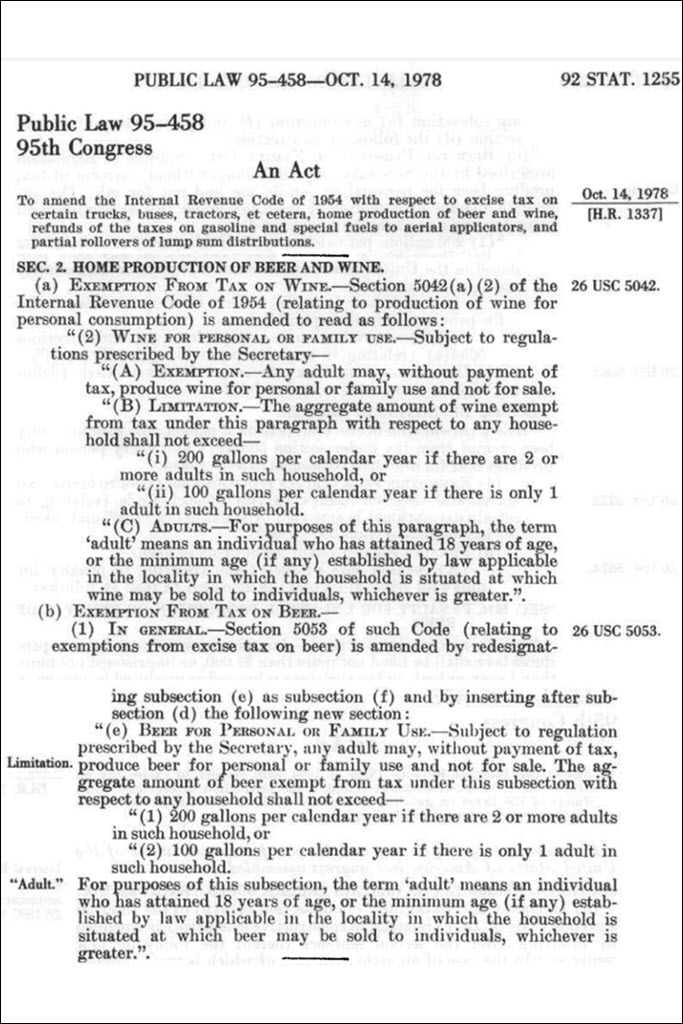
Tonight, we are going to party like it’s 1868. It’s been that long since American’s were allowed to produce beer, wine or spirituous liquor at home without fear of a heavy fine or imprisonment.
On July 20, 1868, the U.S. Congress passed a law declaring, “…no person shall use any still, boiler, or other vessel for the purpose of distilling in any dwelling-house, nor in any shed, yard, or enclosure connected with any dwelling-house, nor on board any vessel or boat, nor in any building or any premises where beer, lager beer, ale, porter, or other fermented liquors, vinegar or ether are manufactured or produced…” A longer excerpt and a link to the full text from the 156-year-old law is included below.
Rules Modified for Beer & Wine in 1979 but Not for Distilled Spirits
For more than a century people interested in at home production of beer, wine and spirits have been trying to get these archaic 19th century laws changed to allow for limited production of beer, wine and spirits at home.
On October 14, 1978, the federal government finally changed its tune when President Jimmy Carter signed HR1337, which allowed any adult to produce wine and beer at home for personal use without federal taxation. The law took effect on February 1, 1979.
Missing from that law was anything about distilled spirits. Many individuals and organizations have continued the fight to allow for home distilling. Year after year those efforts have fallen flat until now.
Stay Informed: Sign up here for the Distillery Trail free email newsletter and be the first to get all the latest news, trends, job listings and events in your inbox.
Federal Court Declares Ban on Home Distilling Unconstitutional
In December of 2023, the Hobby Distillers Association and four of its individual members – sued the Alcohol and Tobacco Tax and Trade Bureau and the Department of Justice, arguing that the federal prohibition of at-home alcohol beverage distilling runs afoul of the United States Constitution. The suit argues that the Constitution creates a federal government of limited powers, and that none of these powers can appropriately be used to prohibit at-home distilling.
The regulatory power of state governments is not at issue in this case: it is only the power of the federal government that this suit challenges. In other words, this lawsuit respects federalism by challenging only the powers of the federal government; the suit does nothing to affect the traditional police powers of the states to regulate the health, safety, and welfare of the public.
On July 10, 2024, a federal court in Texas decided the federal ban on at-home distillation of beverage spirits is unconstitutional.
Lawyers at the Competitive Enterprise Institute (CEI) represent several amateur home-distilling enthusiasts who want to pursue the hobby of at-home distilling of beverage spirits for personal use without the looming threat of legal sanctions. Up until now, under federal law, distilling in one’s home or backyard can result in a $10,000 fine and a five-year imprisonment.
The court found that:
- The federal ban on home distilling exceeds the scope of the federal government’s limited powers.
- The Constitution’s tax power does not allow the federal government to ban home distilling, largely because the ban does not add money into the federal treasury or protect federal tax revenue.
- The Constitution’s power to regulate interstate commerce does not allow the federal government to ban home distilling, largely because the ban neither regulates interstate commerce directly nor is it related to any larger regulatory scheme.
Don’t start home distilling yet. The group is quick to point out that in addition to federal laws, there are state laws governing the making of spirits at home. This decision does not affect the regulatory powers of state governments; the states’ powers to regulate health and safety matters, and thus to regulate home distilling, are untouched by this decision.
“This decision is a victory for personal freedoms and for federalism,” said CEI General Counsel and plaintiffs’ attorney Dan Greenberg. “We’re pleased to see that the court determined that the home distilling ban is unconstitutional – and that it blocked enforcement of the ban against our clients. More broadly, the court’s decision reminds us that, as Americans, we live under a government of limited powers.”
“While the federal government has become more enthusiastic about inflating the scope of its powers over the last century, this case shows that there are limits to the government’s authority,” said CEI attorney and plaintiffs’ attorney Devin Watkins. “If the government appeals this decision to a higher court, we look forward to illuminating those limits.”
The Federal Government Has 14 Days to Reply
The court chose to stay the application of its order for fourteen days so that the government may seek emergency relief at the Fifth Circuit Court of Appeals. The court also determined that some, but not all, plaintiffs in the case lacked standing in the case and therefore dismissed them from it.
The remaining plaintiffs are one corporation and one person: that is, the Hobby Distillers Association – a group with roughly 1,300 members nationwide – and Scott McNutt. The court has enjoined enforcement of the distilling ban against McNutt, the Association, and the Association’s members.
What is Included in the Judge’s Ruling?
The entire ruling from U.S. District Judge Mark T. Pittman is 32 pages. We’ve highlighted a few excerpts from judges ruling including the Opinion & Order, Background and the Conclusion. The full PDF document is included below.
Case 4:23-cv-01221-P Document 49 Filed 07/10/24
OPINION & ORDER
Before the Court is Plaintiffs’ Motion for a Preliminary and Permanent Injunction (ECF No. 17), which the Court has advanced to the case’s merits as authorized by Federal Rule of Civil Procedure 65. For the reasons distilled below, the Court DISMISSES three of the Individual Plaintiffs for lack of standing, but GRANTS the motion as to the remaining Plaintiffs, awarding them declaratory relief and a permanent injunction. But the Court STAYS the applicability of this Order for fourteen days to allow the government to seek emergency appellate relief, if it chooses to do so.
BACKGROUND
This case arises from two federal statutes that regulate the location of distilled spirits plants, or “stills,” which are used to distill beverage alcohol, or “spirits.” Individual Plaintiffs are four people from various states who wish to distill spirits at home for personal consumption. Association Plaintiff, the Hobby Distillers Association, is a Texas-based organization that advocates for the legalization of home-distilling beverage alcohol for personal consumption. The Association has approximately 1,300 members nationwide, including all four Individual Plaintiffs. And it was organized to advocate for the legalization of home distilling while providing information and education to its members on the nuances of distilling various spirits.
Enacted in 1868, 26 U.S.C. § 5178(a)(1)(B) provides that:
[n]o distilled spirits plants for the production of distilled spirits shall be located in any dwelling house, in any shed, yard, or inclosure [sic] connected with any dwelling house, or on board any vessel or boat, or on premises where beer or wine is made or produced, or liquors of any description are retailed, or on premises where any other business is carried on (except when authorized under subsection (b)).
And § 5601(6) makes it a felony to violate § 5178(a)(1)(B), providing that:
[any] person who uses, or possesses with intent to use, any still, boiler, or other utensil for the purpose of producing distilled spirits, or aids or assists therein, or causes or procures the same to be done, in [any location proscribed by § 5178(a)(1)(B), except as authorized by § 5178(a)(1)(C)], shall be fined not more than $10,000, or imprisoned not more than 5 years, or both, for each such offense.
Id. § 5601(a)(6).
Plaintiffs sued, alleging that these provisions are unconstitutional because they exceed Congress’s enumerated powers. Plaintiffs seek declaratory relief and a permanent injunction to prevent their enforcement against them.
The Court held a preliminary injunction hearing on March 28, 2024, and took the Parties’ contentions under advisement. Receiving no objection from either party, the Court advanced Plaintiffs’ request for injunctive relief to the merits. See FED. R. CIV. P. 65(a)(2) (“Before or after beginning the hearing on a motion for a preliminary injunction, the court may advance the trial on the merits and consolidate it with the hearing.”).
Accordingly, the Court now considers the entire record on the merits, treating the Parties’ filings as summary judgment briefs.
LEGAL STANDARD
Here are a few highlights from this section of the ruling. See the PDF below for the full text.
The government next contests redressability and causation. ECF No. 30 at 19, n.1. In sum, the government contends that “the distilling activities they wish to undertake would [still] be subject to various state and local restrictions and requirements.” Id. True. But Plaintiffs contend that they cannot have a state or local permit until a federal permit is issued. ECF No. 31 at 2–3. Thus, Plaintiffs have established causation and redressability because the federal ban on home-distilling is the necessary prerequisite to complying with any other law, regardless of whether they are the subject of this suit.3
3Plaintiffs dispute the government’s contention that Texas law prohibits at home distilling in the first place, because the Texas Beverage Code’s prohibition only applies to “illicit beverages,” which they argue whiskey is not. See TEX. ALCO. BEV. CODE §§ 103.01–.02. Notwithstanding, Plaintiff McNutt is the only Individual Plaintiff with standing. He is coincidentally a resident of New Jersey, and New Jersey law expressly allows distilling and mixing beverages “for immediate personal use” so long as the still is registered with the state. See NJ Rev. Stat. §§ 33:2-10 (2014); 33:1-2. Thus, he could easily comply with local law but for the presence of the federal statutes.
It’s Not You, It’s Me
To be sure, this is not an equal-protection case. But the basic principles are illustrative of why the government’s theory of causation fails. Where a plaintiff’s remedy (e.g., home-distilling) hangs in part on compliance with state law, but that compliance is prevented by federal statute, the federal government does not get to rebuff causation by claiming: “It’s not me, it’s [the states].” If no one had standing to challenge the federal government’s overreach of authority merely because there could be a state law they had to pursue next,4 then the federal government could knock the wind out of any state’s authority on any subject within the jurisdiction it shares with the feds. Federalism would indeed give way to pure subjugation.5
Who is the Hobby Distillers Association?
The Hobby Distillers Association is the trade name of a Texas corporation and is a membership organization whose purpose is to promote the nationwide legalization of home distilling. The Association has over 1,300 members nationwide and educates them on the processes involved in distilling beverage alcohol. It’s leader, Individual Plaintiff Rick Morris, is a certified bourbon steward permitted to redistill alcohol at his business, and he educates the Association’s members in everything distillation.
We reached out to Rick Morris to find out a little more about the Hobby Distillers Association – HDA. Morris said, “Until now the Hobby Distiller’s Association has been a DBA under Brewhaus (a provider of stills, yeast and related items), as that gave us more freedom for lobbying, etc. We are now in the process of filing the paperwork to make the HDA a separate, non-profit (501(c)(6)) corporation.”
Id. at 367. Thus, even where a law is necessary—that is, appropriate, needful, or requisite, see id.—it may still be “improper” if it is “not ‘consistent with the letter and spirit of the Constitution.’” NFIB, 567 U.S. at 559 (quoting McCulloch, 4 Wheat. at 421)). Thus, a law that necessary may still be improper when it violates the principles of a limited federal government.7
On this point, the government argues that no court has recognized a liberty interest in making booze at home. Simply put, home-distilling is not long recognized at common law as essential to the orderly pursuit of happiness. But the government’s cited cases miss the maker’s mark.
It should be stressed that this Opinion does not touch the countless other statutory provisions regarding the distilled spirits tax scheme. Congress may well require a still’s premises to be bonded and registered, bottling in specific sizes, or approval from the Tax and Trade Bureau before distilling, along with the government’s ability to inspect distilling premises—residential or not. The Court assumes without deciding that those provisions are properly reasonable as required by Felsenheld and its progeny. But they are not before the Court here.
CONCLUSION
Judge concludes that Congress has overstepped their Constitutional authority.
Indeed, the Constitution is written to prevent societal amnesia of the defined limits it places on this government of and by the people... That is where the judiciary must declare when its coequal branches overstep their Constitutional authority. Congress has done so here.
Accordingly, having advanced Plaintiffs’ motion to the merits, the Court GRANTS Plaintiffs’ request for relief (ECF No. 17) and DECLARES that 26 U.S.C. § 5601(6) and 26 U.S.C. § 5178(a)(1)(B) are UNCONSTITUTIONAL.
The United States Government is hereby PERMANENTLY ENJOINED from enforcing 26 U.S.C. § 5178(a)(1)(B); 26 U.S.C. § 5601(6); or any regulation promulgated thereunder, against Individual Plaintiff Scott McNutt, Associational Plaintiff Hobby Distillers Association, or the Association’s members. But the Court DISMISSES Individual Plaintiffs Thomas Cowdrey, John Prince, and Rick Morris for lack of standing.
However, the Court hereby STAYS the applicability of this Opinion and Order for fourteen days from the date of this Order to allow the federal government to seek emergency relief at the appellate level, should they choose to do so. SO ORDERED on this 10th day of July 2024.
This is an excerpt, the full text from U.S. District Judge Mark T. Pittman is available in the PDF below.
The Andy Griffith Show
The Morrison Sisters Certainly Have Been Naughty
Making Their Elixir (Moonshine)

Andy: “Oh ladies, you certainly have been naughty.”
Barney: “Naughty? Criminals is what they are, Sheriff. They’re criminals!
Andy: Now, easy, Barney.
Morrison Sisters: Why, we aren’t the criminals. It’s the moonshiners that are criminals. They’ve been selling it for drinking purposes.
Barney: What do you think people do with your stuff? Soak it in bread and eat it?
Morrison Sisters: Out elixir is sold only for celebrations and special occasions.
Andy: What kind of occasions?
Morrison Sisters: Oh, you know, Christmas and New Year’s and 4th of July. And there are lots of other occasions, too. There’s National Potato Week, that’s coming up. And there’s Panama Canal Day and Bastille Day.
Andy: You see, National Potato Week and Panama Canal Day, and Bastille Day and all of those, well, they’re not what you’d call legally recognized holidays.
Morrison Sisters: Sheriff, you mean those men all lied to us just to buy our elixir?
Andy: That’s right.
Morrison Sisters: Lord, can you imagine? Well Sheriff, I guess the only thing to do is go right ahead and do your duty.
Barney: Pow, pow, pow?
Andy: Wait just a minute Barney. Ladies, Miss Clarabelle, Miss Jennifer. (Please step aside)
Barney: [Smashes the still with an axe and the overspray hits Andy in the mouth.]
Andy: Well, I guess it’s all right to have a little taste. After all, it is National Still Smashing Day.
2024: Federal Judge Declares 1868 Law Banning Home Distilling Unconstitutional
1868: Law Outlawing Home Production of Beer, Wine & Spirits

1978: Law Legalizing Home Production of Beer & Wine

Please help to support Distillery Trail. Sign up for our Newsletter, like us on Facebook and follow us on Instagram and Twitter.





